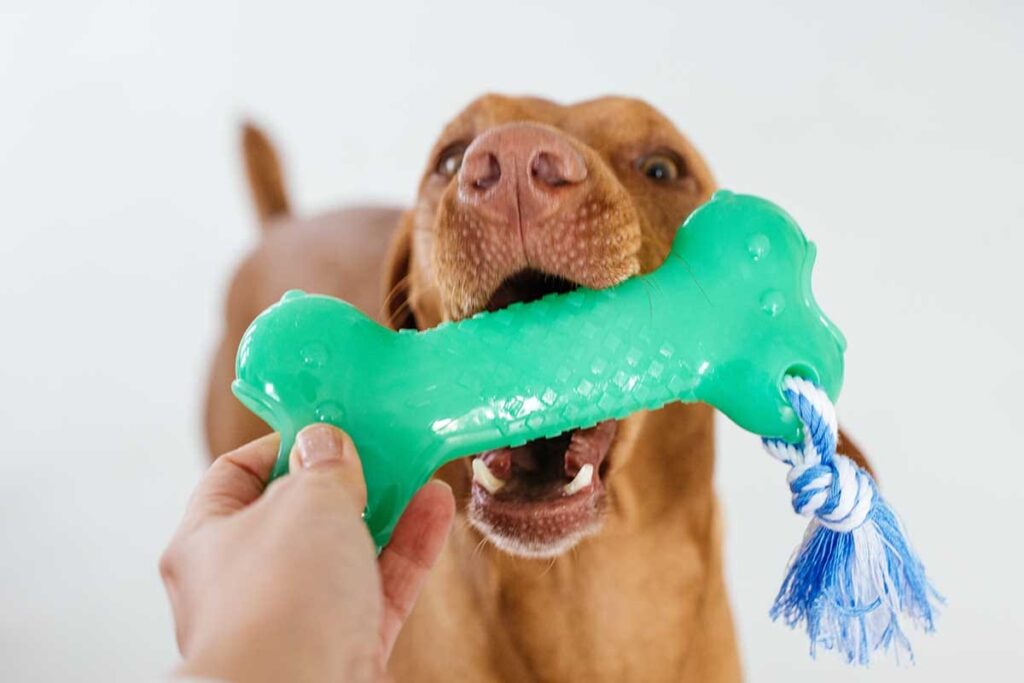This article explores the world of Dental Treats and Toys, highlighting their significance in maintaining healthy teeth and gums. We will delve into the science behind these products, backed by three scientific research studies, and address some common questions regarding dental care for your beloved pets.
The Science Behind Dental Treats and Toys
Study 1: Efficacy of Dental Treats
An American Veterinary Dental College study found that dental treats with specific ingredients can significantly reduce plaque and tartar buildup.
Study 2: Impact of Chewing Toys
Research published in the Journal of Veterinary Dentistry suggests that regular use of dental toys can improve oral health by reducing gum inflammation.
Study 3: Behavioral Benefits
A study from the Journal of Animal Science and Biotechnology indicates that dental toys can reduce stress and anxiety in pets, improving overall well-being.
Read Also: How to Brush Your Dog’s Teeth: 5 Easy Steps
The Importance of Dental Health in Dogs
Why Dental Health Matters
Dental health matters in dogs for several vital reasons, just as in humans. Neglecting your dog’s dental care can lead to various health problems and discomfort. Here are some key reasons why dental health is crucial for dogs:
Prevention of Dental Disease:

Good dental health in dogs is essential to prevent dental diseases, including periodontal disease, gingivitis, and tooth decay. These conditions can cause pain, discomfort, and long-term health issues for your furry friend.
Pain and Discomfort:
Dental problems can lead to pain when your dog chews, and it can make eating a painful experience. This discomfort can result in changes in behavior, including irritability and reluctance to eat.
Preventing Tooth Loss:
Untreated dental issues can lead to tooth loss in dogs, which can impact their ability to eat properly and enjoy their favorite foods. It can also lead to changes in chewing patterns, causing issues like indigestion.
Fresh Breath:
Just like humans, dogs can suffer from bad breath (halitosis) due to dental problems. Maintaining good dental health can help keep your dog’s breath fresh and pleasant.
Preventing Systemic Health Problems:
Dental diseases in dogs can contribute to systemic health issues, such as heart, liver, and kidney problems. Bacteria from dental infections can enter the bloodstream and affect other organs in the body.
Maintaining Overall Well-Being:
Dogs with healthy mouths tend to be happier and more active. Dental issues can affect their quality of life and lead to a less enjoyable and less active lifestyle.
Aging Gracefully:
As dogs age, they become more susceptible to dental problems. Proper dental care throughout their lives can help them age gracefully and enjoy a better quality of life in their later years.
Reducing Veterinary Bills:
Preventative dental care, such as regular dental check-ups and cleanings, can be less expensive in the long run compared to treating advanced dental diseases or dealing with health issues stemming from poor dental health.
Long-Term Cost Savings:
Prioritizing your dog’s dental health can lead to long-term cost savings by avoiding expensive dental procedures and addressing potential systemic health issues.
Enhanced Bond with Your Pet:
Maintaining your dog’s dental health is part of being a responsible and caring pet owner. It helps build a stronger bond between you and your furry companion.
Dental Treats: A Delicious Solution

What Are Dental Treats?
Dental treats are specially designed snacks for pets that help improve their oral health. They are often formulated to reduce plaque and tartar buildup, providing a tasty way to clean teeth and freshen breath.
Choosing the Right Dental Treats
Not all dental treats are created equal. Look for products with the Veterinary Oral Health Council (VOHC) seal, indicating that the treats meet specific oral health standards.
Dental Toys: Fun and Beneficial

Materials:
Dental toys are typically made from non-toxic, pet-safe materials. They are designed to withstand the wear and tear of chewing and gnawing. Many dental toys are made from rubber, nylon, or other durable materials.
Texture:
Dental toys often have textured surfaces that can help scrape away plaque and tartar from a pet’s teeth as they chew. The texture can vary, with some toys having bristle-like projections or grooves to aid in cleaning.
Shape and Design:
These toys come in various shapes and sizes, including bone-shaped, stick-shaped, or other creative designs. The shape can impact how well they clean different areas of the mouth.
Flavor:
Some dental toys are flavored to make them more appealing to pets. This can encourage them to chew on the toy for longer periods, further aiding in dental hygiene.
Promotion of Saliva:
Chewing on dental toys can stimulate saliva production. Saliva contains enzymes that help break down food particles and bacteria in the mouth, reducing the risk of dental issues.
Exercise and Mental Stimulation:
Chewing on dental toys also provides pets with mental stimulation and exercise. This can help keep their minds active and relieve boredom, which can be particularly useful for dogs.
Dental Health Benefits:
Regular use of dental toys can help reduce the buildup of plaque and tartar on your pet’s teeth. This, in turn, can prevent dental issues such as gingivitis, bad breath, and tooth decay. It can also reduce the need for costly dental cleanings under anesthesia.
Safety:
While dental toys can be beneficial for your pet, it’s important to select a product that is safe and appropriate for your pet’s size and chewing habits. Always supervise your pet while they are using a dental toy, and consult with your veterinarian to choose the best option for your specific pet’s needs.
Conclusion
Dental treats and toys are not just indulgent snacks or playthings for your pets; they are essential tools in maintaining their dental health. With the scientific evidence backing their efficacy, these products can keep your furry friends smiling and free from dental woes. So, invest in their oral care and ensure their well-being for years to come.
Read Also: dental toys for dogs
FAQs:
1. How often should I give my pet dental treats?
Dental treats can be given daily but should be used in moderation. Follow the recommendations on the product packaging or consult your veterinarian.
2. Are dental toys suitable for all breeds of pets?
Dental toys are generally suitable for most breeds, but always consider your pet’s size and chewing habits when selecting an appropriate toy.
3. Can dental treats replace regular brushing?
While dental treats are beneficial, they should not replace brushing. Regular brushing is still essential for maintaining proper oral hygiene.
4. Are dental treats safe for puppies and kittens?
Yes, there are dental treats designed specifically for young pets. Make sure to choose age-appropriate products.

2 thoughts on “Dental Treats and Toys: A Healthy Smile for Your Furry Friends”